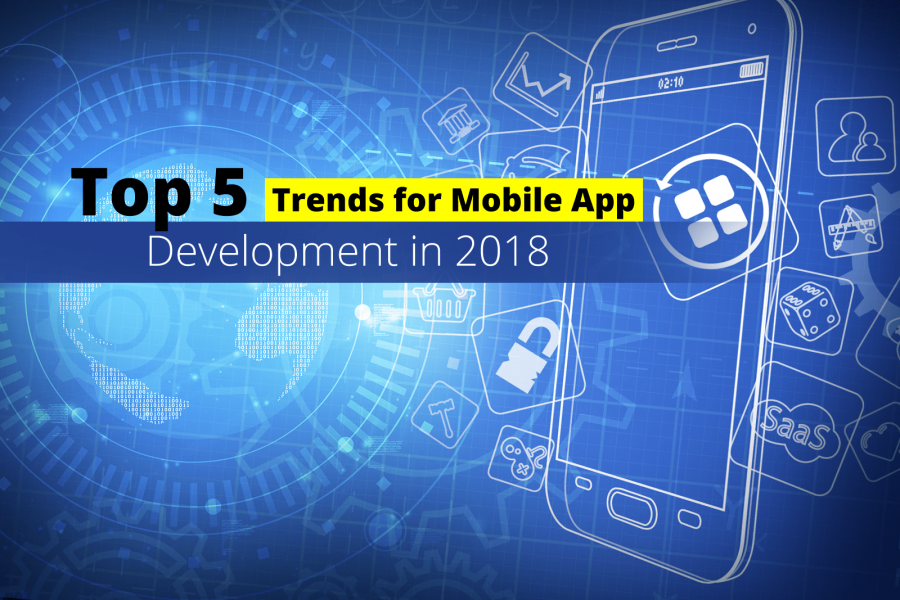
It’s been a great year for mobile apps. In fact, in the third quarter of 2017, both Apple’s App Store and Google Play combined accounted for almost 26 billion downloads worldwide (generating $17 billion in revenue, up 8% over the same period last year).
Like it became imperative for businesses to have a website during the Dotcom boom, mobile apps have now made the transition from being an optional investment to a necessity. It’s also important because mobile now accounts for almost 70% of digital media time.
The overall mobile marketplace is currently dominated by apps from Google’s Play Store, social media apps, lifestyle apps, and gaming apps. However, enterprises are leveraging mobile apps for branding, enhanced customer engagement, and direct marketing.
Going into 2018, here are the top five mobile app development trends that will determine the future of this niche.
1. Accelerated Mobile Pages
We’re about to enter the age of Accelerated Mobile Pages (AMP) to expedite page loading times on mobile devices and enhance User Experiences (UX). Speeding up loading times will play a key role in reducing bounce rates.
AMP is also expected to boost the following:
- Number of visitors
- Visibility
- Page ranking
- Clickthrough rate (CTR)
- Visitor analysis
This approach will offer easier content placement, better ad visibility, and the provision of isolated search index for mobile web. The latter, in terms of SEO, will transform the current approach to mobile app development. This model will not require a sitemap or many migration efforts.
2. Augmented Reality (AR) & Virtual Reality Apps
This year AR and VR apps started making the transition from entertainment and gambling to other areas of business. This trend is expected to grow in the new year creating more realistic and unambiguous experiences.
AR is expected to be more embedding in the following industries in 2018:
- Life science
- Manufacturing
- Retail
To get an idea of what we can expect, check out the Ikea Place app which was built with Apple’s ARKit. It’s a fantastic example of how AR will transform mobile shopping experiences.
As enterprises look to innovate, both AR and VR have a huge potential of transforming multiple industries including healthcare, engineering, real estate, and of course retail.
3. Cloud-Based Application Development
The industry is also expected to be revolutionized by mobile apps with direct cloud interaction. This means that more developers will be able to build apps that demand less internal memory.
This approach has the potential to unleash a wide variety of powerful mobile apps that can access data directly from the cloud without overwhelming the smartphone’s internal memory. This is a highly attractive model for enterprises strive to alleviate the data security issues inherent in BYOD (Bring Your Own Device) initiatives.
According to the technology giant Cisco, cloud-based apps will drive 90% of all global mobile data traffic by 2019. Mobile cloud traffic is also expected to grow by 11-fold with a compound annual growth rate (CAGR) of 60%.
4. Predictive Mobile Apps
Artificial Intelligence (AI) and Machine Learning (ML) will play a key role in mobile apps going forward. This will enable apps to recognize complex patterns, analyze a massive amount of data in real-time, and derive valuable insights.
These intelligent apps called predictive apps are expected to revolutionize the healthcare industry in the new year by helping make a timely diagnosis that is supported by a robust treatment plan. For example, you can expect healthcare apps to provide drug information, usage alerts, and conduct checks to ensure proper adherence.
To get a better idea, check out the Plexus mobile app which was built using Axway Appcelerator. The primary focus here is to help patients better manage their medication by leveraging ML.
5. Mobile Application Security
As we continue to manage a large chunk of our lives from mobile devices, mobile security will be critical as devices now contain more personal data than ever before. As a lot of people still don’t perceive mobile security in the same way as protecting their laptops and PCs, this will continue to be a major concern in 2018.
According to Gartner, approximately 75% of mobile apps can’t even pass basic security tests. These vulnerabilities can come in many different forms including:
- Poor authentication and authorization
- Weak server-side control
- Insufficient binary protection (reverse-engineering vulnerability)
- Poor transport layer protection
- Unintended data leakage
In the coming months, you can expect more apps with built-in security features to improve app protection. This will translate into enhanced UX with more security features.
As mobile app development enters its tenth year in 2018, we can expect developers to continue to innovate to meet the evolving demands of the market.
Need a dedicated team of developers for your new project? Digi117 will help you find and hire top tech talent to develop your product. To hire developers, get in touch with one of our in-house experts.









